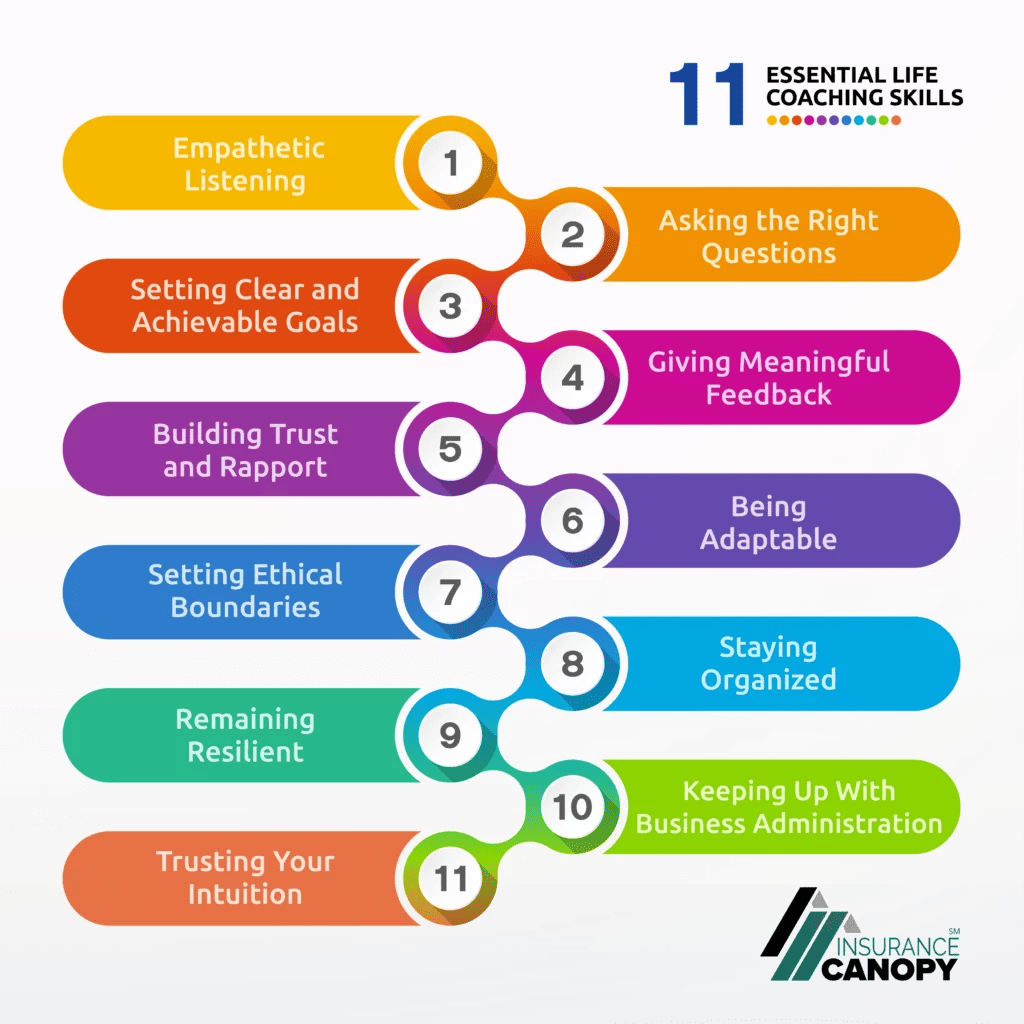The field of life coaching is as broad and varied as life itself. Where one coach focuses on helping clients manage their ADHD and learn to thrive, another guides corporate executives through a merger to ensure a seamless, successful transition.
No matter what type of life coach you are or your specialty, there are certain life coaching skills that everyone in this profession should be an expert in. Learn what those skills are and some key life coaching tips to help you offer clients a high-quality, results-driven coaching experience.

Looking into launching your life coaching biz? Here’s what you need to know.
Life Coaching Skill #1: Empathetic Listening
Listening is a good skill for anyone, but you need to take this one step further — you should be an empathetic listener.
This is a type of active listening where you remain attentive to the other person’s emotions and input during a conversation. The goal is to find similarities between their feelings and experiences and your own, so you can give a more thoughtful, heartfelt response.
Empathetic listening also means you know when to offer support versus advice. You’ve probably had an experience talking to someone where you just needed encouragement, but the other person was focused on finding a solution. You probably felt frustrated and unheard, which is how your clients could feel if you unknowingly did the same for them.
How to Improve
- Practice mindfulness techniques to stay fully present when speaking with clients
- Learn to focus on the message behind the words your client is saying; discern what they aren’t saying out loud and what emotions they’re feeling
- Acknowledge and validate your clients’ feelings by reflecting what they’ve said back to them (e.g., “I can tell this is very stressful for you”)
- Learn to recognize non-verbal clues, such as reading body language, to determine how a client is feeling
- Be patient and don’t be afraid of silence; give your client plenty of space to express themselves
Life Coaching Skill #2: Asking the Right Questions
Knowing how to ask the right questions goes hand in hand with being an empathetic listener. Asking questions that get to the heart of your clients’ goals, fears, or frustrations helps foster their growth and sense of self-discovery (a big part of why they hired you!).
Asking questions not only helps your client understand their wants and needs better, it also helps you understand them. While you may have some clients who are very forthcoming or self-aware, you will have those who aren’t.
That’s where the role of questioning comes in: you get the information and insights you need to develop a personalized, effective coaching plan that gets results.
How to Improve
Adopt a beginner’s mindset each session and stay curious; avoid making assumptions and being judgmental
Use the 5 Whys technique to get to the root of what a client is saying and avoid settling for shallow responses that don’t address the real issue
Ask “what if” questions (e.g., “What if there were no obstacles in your way — what would you do?”) to get your client to think creatively and explore new possibilities
Practice self-reflection after each session, asking yourselves which questions led to breakthroughs for your client and which didn’t resonate

Life Coaching Skill #3: Setting Clear and Achievable Goals
Anyone can set goals, but it takes skill to make them realistic and achievable. This is critical when helping clients meet daunting goals.
The most common goal-setting framework life coaches use is the SMART method, which requires all goals to be:
- Specific: Identifies exactly what needs to be achieved and what steps must be taken to do so
- Measurable: Quantifies the goal (e.g., if your client is a small business owner, they may have a goal of making $10,000 per month by the end of the year)
- Achievable: Makes sure that the goal is realistic
- Relevant: Ties the goal to a bigger picture and provides the “why” behind setting this particular goal
- Time-Bound: Creates a deadline for this goal and typically includes several time-related milestones before the overall goal is met
How to Improve
Learn and incorporate coaching methods that help clients achieve their goals, including GROW (Goal, Reality, Options, and Will) and WOOP (Wish, Outcome, Obstacle, and Plan)
Take courses that focus on goal-setting, such as Udemy’s Goal Setting to Success or Transformation Academy’s Goal Setting Life Coach Certification
Stay on top of measuring progress with goal-tracking templates like this free one from Mindful Coaching Tools (or make your own!)
Collaborate with your clients on setting goals; don’t be prescriptive and create goals for them or ask them to come up with some entirely on their own
Request feedback from your clients about their experience setting and tracking goals with you throughout the process; make adjustments to your methods as needed
Reflect on your own goal-setting habits and ask yourself what you did to see results and what kept you on track — chances are, what worked for you may work for someone else
Life Coaching Skill #4: Giving Meaningful Feedback
Providing feedback is one of the crucial responsibilities of your life coaching career. It’s key to your client’s growth and keeps them on track to success in reaching their goals.
Good feedback promotes:
- Self-awareness: Clients have a more realistic view of their situation and their progress when they receive regular feedback from you
- Accountability: Feedback can determine whether a client is on track to reach their goals and identify where they need to improve, fostering a sense of ownership
- Motivation: Clients can see how they’ve progressed through feedback and may feel energized by what they’ve accomplished so far
How to Improve
Offer positive reinforcement first; your clients want to know that they’re doing something right, and their hard work has been paying off
Provide specific, actionable feedback that clearly explains what you’re referring to and what clients can do to address it
Use the SBI model (Situation, Behavior, and Impact) as a framework for your feedback; provide context, describe the specific actions your client took, and explain the impact of those actions
Balance criticism with positive feedback to make sure your client doesn’t get discouraged
Involve your clients in the feedback process by asking them to self-evaluate and take ownership of their progress
Life Coaching Skill #5: Building Trust and Rapport
Trust is the foundation of any strong relationship, and the connection between you and your clients is no different. You must provide your clients with a safe space to be open and honest about their ambitions and struggles with you.
This level of trust leads to a solid rapport between you and your clients. If they feel comfortable being vulnerable with you, they’re more likely to be forthcoming with their feelings and needs.
How to Improve
Be authentic and open about your own experiences to show clients that you can relate to their situation; share a personal story early on that relates to their goals
Maintain transparency with your clients about your methodology and what they can expect from each session
Connect with your clients in a human way; maybe you’re both obsessed with the same TV show or come from the same hometown
Be present in each session by removing distractions or picking a meeting spot that isn’t too noisy or disruptive

Life Coaching Skill #6: Being Adaptable
Like any type of coach, life coaches often need to think on their feet. You may plan to work on a particular topic with a client during one session, only to realize that what they really need right now is help in an entirely different area.
The best life coaches don’t let big or small hiccups get in the way of their clients’ progress. Instead, they’re flexible enough to pivot their approach or plan to suit those needs.
Being an adaptable life coach also means changing your methods to suit different learning styles. No two clients are the same, and while some approaches may work for most of them, it’s never one-size-fits-all.
How to Improve
Ask for feedback from clients and be open to changing based on what you receive
View challenges or setbacks as learning opportunities and not losses
Don’t be afraid to try new life coaching techniques or methods; sometimes, all it takes is a little trial and error before you find an approach that resonates
Ask your clients what their preferred learning style is; some people like to have a lot of structure, while others become quickly frustrated by that
Keep your plans flexible; it’s a lot easier to make adjustments on the spot when you aren’t working within a rigid framework
Life Coaching Skill #7: Setting Ethical Boundaries
For many of us, setting boundaries feels harsh. It’s hard to know where to draw the line, especially when you’re just starting your life coaching career and are connecting with your first clients.
But the truth is, setting boundaries is critical to your (and your client’s) success. Here’s why:
- It keeps your relationship professional
- It prevents your clients from becoming too dependent on you for support, validation, and decision-making
- It protects your mental and emotional well-being and prevents you from common life coach hardships like burnout and compassion fatigue
How to Improve
Define your availability outside of sessions; are you comfortable with clients texting you at 11:00 PM, even if it’s related to something you’re working on together?
Avoid getting too involved in your clients’ private lives and offering advice about situations that do not pertain to your sessions
Keep your clients’ information and session notes private, and include a confidentiality clause in your contract
Learn and practice cultural sensitivity via workshops to avoid awkward miscommunications and overstepping boundaries
Set clear expectations and boundaries with your clients upfront to avoid awkward interactions later on
Life Coaching Skill #8: Staying Organized
This may not immediately come to mind as a must-have skill for a life coach, but it absolutely is. No matter how many clients you have, staying organized is critical to being the best coach you can be.
Being organized helps you:
- Manage your time effectively
- Plan personalized sessions
- Keep tabs on your clients’ progress
- Reduce your stress levels
How to Improve
Utilize free life coaching tools you and your clients can use to keep session notes and goal progress in order
Use a Client Relationship Management system (CRM) to streamline scheduling, progress tracking, and communication, such as Simply.Coach or Bonsai
Templatize your session plans and reports when possible that you can replicate for each individual, filling in the blanks with client-specific information
Create a designated workspace with minimal distractions and keep it tidy and organized with file folders and caddies

Life Coaching Skill #9: Remaining Resilient
Many life coaches impart resilience to their clients, but it’s also a skill you must master yourself. As Cara Heilmann, President of the International Association of Career Coaches, puts it: “Working for yourself is hard. You’ll go through rough patches, periods of doubt, and at times wonder why you came into this field.”
The funny thing about being a life coach is that you may guide a client through a rough patch while working through one yourself. Yet, you still need to be able to give them 100%.
Heilmann recommends viewing these times through a lens of learning.
“The best way to practice resilience is simply to treat tough situations as training. When you feel down on your luck or hopeless about your work, view that as your training ground for resilience.”
- Cara Heilmann, President of the International Association of Career Coaches
How to Improve
Recognize and regulate your own emotions while coaching by developing emotional intelligence (EQ)
Build an arsenal of healthy coping mechanisms, such as taking a walk, going to the gym, journaling, or doing breathing exercises
Foster a support network made up of other life coaches, whether through local groups or larger associations like Life Coaches Connect
Maintain a work-life balance by setting clear working hours, setting aside time for hobbies and relaxation, and giving yourself time off when you’re feeling overwhelmed
Life Coaching Skill #10: Keeping Up With Business Administration
Being a life coach means being your boss… which means you’re also in charge of the business end of things as much as the coaching that initially drew you to this career. That’s what makes administration one of the most essential parts of being a successful life coach.
This involves several key tasks, such as:
- Client management: Scheduling, maintaining records, communication, and session reminders
- Payment management: Creating and sending invoices, tracking payments, and following up on outstanding invoices
- Tax management: Filing taxes and keeping accurate records of your income and expenses
- Contract and legal management: Creating a client contract and managing your own intellectual property, such as online courses or downloadable materials
- Marketing management: Promoting your business, acquiring new clients, and retaining existing ones
- Life coach insurance management: Finding the right policy to protect your business from the cost of life coaching risks
Pro Tip: Not sure where to start with insurance, or if you really need it? Check out our ultimate guide to life coach insurance and get the answers you need, with none of the fluff.
How to Improve
Develop your financial literacy by using accounting software like QuickBooks or FreshBooks
Dedicate portions of your week to administrative tasks to make sure you stay on top of them
Improve your branding by defining your life coaching niche to reach the right clients who will benefit most from your services
Work with a lawyer to develop a sound contract that protects you and your clients and prevents potential legal disputes
Attract clients with proven strategies, such as leveraging social media and email marketing
Get an insurance policy that contains both general and professional liability coverage (like Insurance Canopy’s, which can cost as little as $21.08 per month!)
Life Coaching Skill #11: Trusting Your Intuition
We’ve all been told to trust our gut before, which is easier said than done for those of us who are habitual overthinkers. However, your intuition is a valuable asset in your life coaching practice that can:
- Create a deeper connection between you and your client, as you perceive their unspoken needs and wants
- Help you pivot and adapt your session or overall strategy to suit your clients’ needs
- Foster a safe, trusting environment where your clients don’t feel like you might push them too far outside their comfort zone
If you feel out of touch with your intuition, you’re not alone! The good news is that you can rebuild your connection to this innate sense with a little time and practice.
How to Improve
Reflect on past coaching sessions to see if there were moments when you felt a strong hunch to ask a certain question, or try a new coaching method, and determine whether that feeling led to a positive result
Practice trusting and following your gut feelings when they come around, and note what the result is afterwards
Build on your EQ and practice recognizing the difference between an emotional reaction and your intuition
Have a mentor supervise a coaching session (with your client’s consent); they may be able to identify moments where you followed your intuition successfully or missed important cues

FAQs About Essential Skills for Life Coaches
What Qualifications Do I Need to Become a Life Coach?
You don’t need a specific degree, certification, or license to become a life coach. However, many still choose to become certified coaches through one of the following programs because it adds legitimacy and value to their services:
How Do I Know if I’m Ready to Start Life Coaching?
Asking yourself these questions can help you determine if you’re ready to begin your life coaching career:
- Are you ready to make a major change in your life and the lives of others?
- Have you accomplished something significant in relation to your life coaching niche? (E.g., If you want to be a small business coach, did you start and run your own successful small business?)
- Do you consider yourself a lifelong learner who likes to build on your existing skills and acquire new ones?
- Are you excited and energized by the prospect of owning your own business?
- Is having a career that feels spiritually and personally fulfilling important to you?
Can I Specialize as a Life Coach?
Yes! The life coaching field is broad, so carving out your niche is highly recommended. We covered 27 different types of life coaches in a previous blog, with information about what qualifications are recommended for each niche and a decision tree to help you pick the best fit for you!





